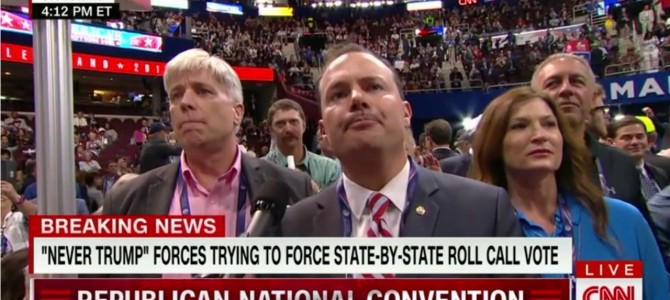CLEVELAND – The big news out of the Republican National Convention Monday is that the GOP establishment summarily quashed an effort by grassroots conservatives to force a roll call vote on the convention rules—a last ditch effort to assert some control over a party that now unquestionably belongs to its nominee, Donald Trump.
Late in the afternoon on Monday, Sen. Mike Lee of Utah led the conservatives’ effort to force the roll call vote. If the convention rules had been voted down, that would have meant convention delegates could have the chance to nominate a candidate other than Trump.
Although the effort failed, it wasn’t at all clear that convention officials followed the rules in quashing it. Lee and his allies claimed that a majority of delegates from 10 or 11 states submitted a request for a vote on the rules. Majorities from only eight states are needed to force a vote on the rules.
But in a process that’s still unclear, all but six or seven states were disqualified and the roll call vote was denied. Lee and his allies, including former Virginia Attorney General Ken Cuccinelli, claim that GOP leaders cut short a legitimate process for the sake of projecting unity. “I’m still looking for answers,” Lee told CNN late Monday afternoon. “I’m trying to find out what happened.”
But instead of unity, the overwhelming feeling Monday afternoon and evening was chaos. Pro-Trump delegates claimed the rules vote was about denying the Trump nomination, while Lee and Cuccinelli insisted it was about reforming the party’s process and empowering the grassroots to have more say on a number of issues relating mostly to future conventions, not Trump’s nomination.
Instead of a roll call vote, the convention chair called a voice vote on the rules question. Broadcast live on CNN, the voice vote was farcical. The “Ayes” and the “Nays” were more or less indistinguishable, even after a second voice vote. Instead of a roll call vote that would have revealed where the delegates stand on the rules question, the country was treated to the equivalent of a stadium-sized “applause-o-meter.”
Although the effort was cast as a ploy by anti-Trump elements, many of the rules delegates wanted to change had to do with whether state primaries would be open or closed. Both Lee and Cuccinelli said the rules vote was more about future elections than whether or not Trump is the nominee this year.
While the minutiae of parliamentary procedure might not matter to most Republican voters, what should matter to them is that there wasn’t even a cursory effort to ensure that this was a fair process.









